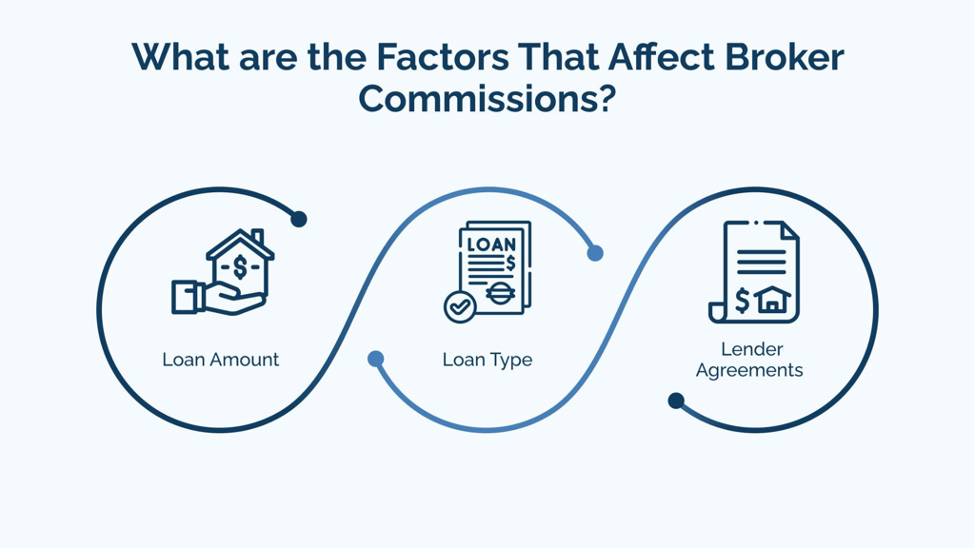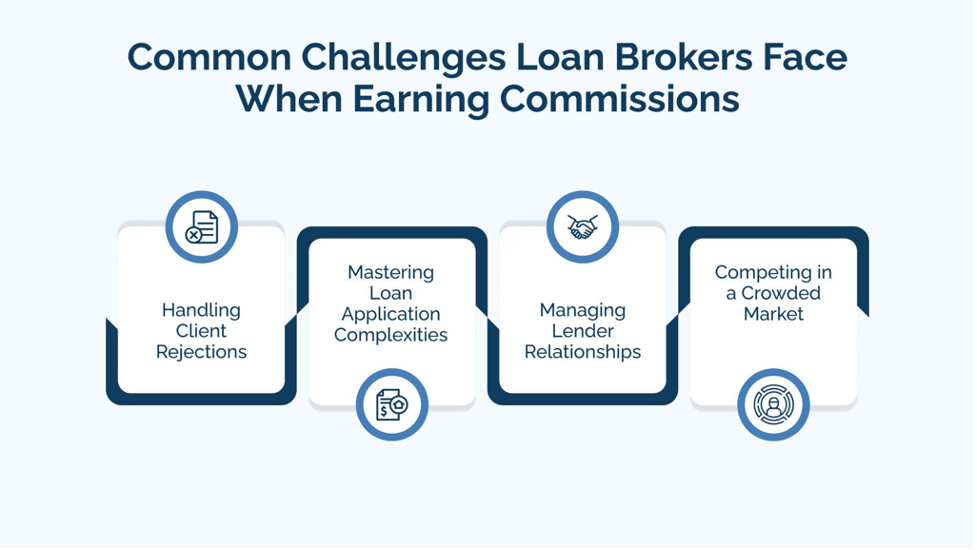
The mortgage brokerage services market is projected to reach $74.3 billion by 2030. This is a clear sign of just how vital brokers are in the loan process. For those who know how to maximize their earnings, this industry offers incredible profit potential.
“But if the industry is so lucrative, why am I not earning as much as I expected?”
“ Why do some brokers close high-paying deals while I struggle to make a decent income?”
“Am I working with the right lenders?”
“ Is my commission structure competitive enough?”
If you’ve ever asked yourself these questions, it’s important to gain clarity on the commission structure. Many brokers face challenges in optimizing their earnings. By learning how commissions work, what factors affect earnings, and how to scale your business, you can maximize your profitability and build a sustainable career in loan brokerage.
How Do Loan Brokers Get Commissions?
Loan brokers earn commissions by connecting borrowers with lenders and facilitating loan transactions. The commission is a percentage of the loan amount, but the structure varies based on loan type and lender agreements. Knowing these structures helps brokers identify the most profitable deals.
Major commission structures include:
Origination Fees: A percentage of the loan amount, usually ranging from 1% to 3%. The borrower pays this fee.
Yield Spread Premium (YSP): A fee paid by the lender when the broker secures a higher interest rate than the base rate offered.
Fees: Fixed amounts charged by brokers instead of percentage-based commissions.
To maximize commissions, brokers must:
- Understand which fee structures apply to different loan types.
- Negotiate effectively with lenders and clients.
- Offer various loan products to attract a broader client base.
- Build strong relationships with multiple lenders for better commission rates.
What are the Factors That Affect Broker Commissions?

Several factors influence how much a broker can earn from commissions.
1. Loan Amount
One of the most critical factors influencing broker earnings is the loan amount. Larger loans result in higher commissions since fees are often calculated as a percentage of the total loan.
2. Loan Type
The type of loan also plays a significant role in commission earnings. Residential, personal, and business loans have different commission structures. Commercial loans often yield higher commissions due to their larger size and longer processing times. However, they also require more expertise and networking.
3. Lender Agreements
Lender agreements play a crucial role in commission earnings. Some lenders offer better commission rates or incentive programs for brokers who bring in a high volume of clients. Establishing strong relationships with multiple lenders gives brokers more options and better negotiating power.
How Can You Start Earning a Commission as a Loan Broker?
Earning commissions as a loan broker requires strategic planning and a client-focused approach. Success depends on working with the right lenders, understanding client needs, and maintaining a steady flow of leads. By mastering these steps, brokers can maximize their income and build a thriving business.
Partnering with the Right Lenders
Choosing the right lenders is crucial to success in loan brokerage. Look for lenders with competitive rates, transparent commission structures, and strong reputations. Building trusted relationships ensures smoother transactions and better loan options for clients. A diverse network of lenders offers brokers a wider range of financing solutions.
Understanding Client Needs
Successful brokers prioritize understanding their clients’ financial situations and goals. Conduct in-depth consultations to assess credit history, borrowing capacity, and loan preferences. Providing personalized recommendations and educating clients on loan terms builds trust and increases approval chances. A client-first approach strengthens relationships and leads to more referrals.
Building a Steady Lead Pipeline
Generating a consistent flow of clients is essential for long-term success. Leverage online marketing, social media, and networking to attract borrowers. Establish referral partnerships with real estate agents, financial advisors, and other industry professionals. A strong lead generation strategy ensures a continuous stream of commission-earning opportunities.
Common Challenges Loan Brokers Face When Earning Commissions

By proactively addressing these challenges, loan brokers can increase their efficiency, improve client trust, and maximize their earning potential.
Handling Client Rejections
Client rejections are inevitable in loan brokerage. Not every borrower will qualify, and not every client will proceed with a loan. A skilled broker learns to handle rejections professionally, offering alternative financing solutions or referring clients to other lenders. Maintaining a positive attitude and staying proactive can turn rejections into future opportunities.
Mastering Loan Application Complexities
Loan applications involve extensive documentation and underwriting requirements. Brokers must guide clients through the process, ensuring accurate and complete paperwork. By simplifying complex loan procedures, brokers can improve approval rates and enhance client satisfaction. Keeping up with regulatory changes also ensures smooth loan transactions.
Managing Lender Relationships
Strong relationships with lenders are essential for securing competitive loan options. Brokers must communicate, stay updated on lender policies, and negotiate favorable terms. Effective lender partnerships improve loan approval rates and lead to higher commissions. A broker who consistently delivers well-prepared applications earns a trusted reputation among lenders.
Competing in a Crowded Market
The loan brokerage industry is highly competitive, with many brokers vying for clients. To stand out, brokers must offer personalized service, market expertise, and valuable financial advice. Utilizing digital marketing, networking, and client referrals can help brokers attract more business. Continuous learning and staying ahead of industry trends also provide a competitive edge.
Crucial Factors That Shape a Loan Broker’s Success
Several elements determine the earnings potential of a business loan broker. Success in this field depends on experience, industry reputation, client demographics, specialization, and market trends.
Industry Experience
Seasoned brokers often have well-established lender connections, a solid track record, and a deeper understanding of the loan process. This expertise helps them close deals more efficiently, leading to higher earnings.
Professional Reputation
A broker’s credibility is crucial in attracting clients and lenders. Positive reviews, referrals, and a reputation for reliability can drive more business, increasing income potential.
Client Portfolio
The type and size of a broker’s clientele impact their earnings. Brokers working with larger corporations or high-net-worth individuals typically handle more significant loan amounts, resulting in higher commissions than those serving smaller businesses.
Niche Expertise
Specializing in specific loan types or industries, such as commercial real estate financing, allows brokers to position themselves as experts. This expertise can justify premium fees and attract more lucrative deals.
Economic Climate
The lending market fluctuates based on economic conditions. During strong economic growth, there is typically a higher demand for loans, creating more opportunities for brokers to secure financing and boost their earnings.
While these factors shape earning potential, success ultimately depends on a broker’s networking skills, marketing efforts, and ability to close deals effectively.
How Are Loan Brokers Paid?
Loan brokers are compensated differently depending on the loan agreement. Their payment may come directly from the borrower or be covered by the lender.
- Borrower-Paid Compensation: If the borrower is responsible for the broker’s fee, it is paid at closing. This cost is usually agreed upon beforehand and appears in the loan estimate.
- Lender-Paid Compensation: When the lender covers the broker’s commission, the fee is often rolled into the loan amount. While the borrower does not pay the broker directly, they may bear the cost through a higher interest rate or origination fee
Because fee structures vary, borrowers should carefully review their loan agreements to understand the full cost of working with a mortgage broker.
Maximize Your Deal Flow & Earnings with Bluestone Commercial Loans

Why Partner with Bluestone?
- Direct Access to Underwriting – Work closely with our in-house team for fast, reliable decisions.
- Fast Turnaround – Receive pre-approvals or term sheets within 24 hours and close deals in as little as 72 hours.
- Broker Protection – Competitive broker compensation, paid post-closing, with transparent borrower fees.
- Low Fees, High Certainty – Benefit from competitive rates with minimal underwriting and servicing costs.
- Higher Loan Quality – Our thorough underwriting and risk assessment help reduce defaults.
Maximize your earnings with Bluestone.
Join our broker referral program today and get exclusive benefits. Let’s grow your business together.
FAQs
- How Are Loan Brokers Paid?
Loan brokers are compensated differently depending on the loan agreement. Their payment may come directly from the borrower or be covered by the lender.
- Borrower-Paid Compensation: If the borrower is responsible for the broker’s fee, it is paid at closing. This cost is usually agreed upon beforehand and appears in the loan estimate.
- Lender-Paid Compensation: When the lender covers the broker’s commission, the fee is often rolled into the loan amount. While the borrower does not pay the broker directly, they may bear the cost through a higher interest rate.
Because fee structures vary, borrowers should carefully review their loan agreements to understand the full cost of working with a mortgage broker.
- What is the best way to increase commission earnings?
Brokers can increase earnings by expanding their loan offerings, partnering with multiple lenders, and improving marketing efforts. Building a strong referral network and offering excellent customer service leads to repeat business and higher commissions.
- Are loan broker commissions negotiable?
Yes, commissions are often negotiable. Based on performance, loan volume, and long-term partnerships, brokers can negotiate better commission rates with lenders.
- What types of loans offer the highest commissions?
Commercial real estate and business loans typically offer the highest commissions due to their large loan amounts and complexity. These loans require specialized knowledge, but they provide brokers with substantial earning potential compared to residential mortgages or personal loans.
- Do brokers need a license to earn commissions?
Most loan brokers need a license to operate legally, especially in mortgage lending. Licensing requirements vary by location and loan type. Some states require mortgage brokers to pass an exam and complete pre-licensing education before earning commissions.